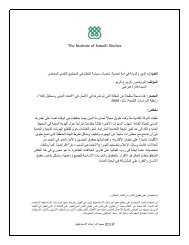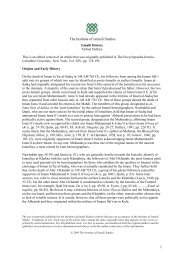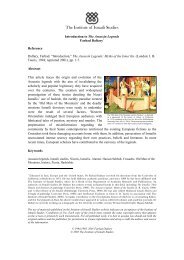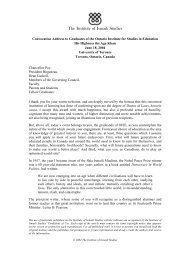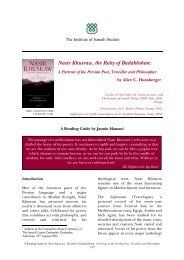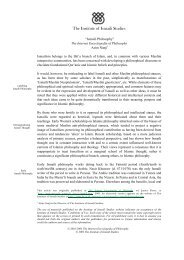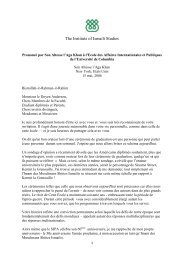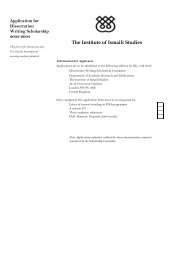GPISH prospectus 2012-16_Layout 1.qxd - The Institute of Ismaili ...
GPISH prospectus 2012-16_Layout 1.qxd - The Institute of Ismaili ...
GPISH prospectus 2012-16_Layout 1.qxd - The Institute of Ismaili ...
Create successful ePaper yourself
Turn your PDF publications into a flip-book with our unique Google optimized e-Paper software.
always a neat or hard and fast phenomenon at all periods <strong>of</strong> history. <strong>The</strong> number and<br />
boundaries <strong>of</strong> the groups tended to fluctuate with time and place. <strong>The</strong> programme will show<br />
the emergent character <strong>of</strong> these divisions, rather than assuming them as a given fact. Similarly,<br />
assumptions (even where these are implicit rather than explicit) like “orthodoxy” and<br />
“heterodoxy” have a strong influence on the way in which Islam is understood. Again, the<br />
historically-based approach in this programme will seek to understand how and where these<br />
or similar concepts were arrived at, rather than taking them as given.<br />
Poetic and imaginative discourse<br />
An historical approach to Islam must be balanced by a due appreciation <strong>of</strong> the meaning<br />
religious ideas have for their followers, and the centrality <strong>of</strong> spiritual and ethical aspirations<br />
in their lives. <strong>The</strong> programme will give due attention, therefore, to the role <strong>of</strong> poetic and<br />
imaginative discourse in the shaping <strong>of</strong> spiritual life in Muslim cultures.<br />
Cultural diversity<br />
While the approach to Islam as a civilization is intended to integrate as well as enlarge both the<br />
subject-matter and the angles <strong>of</strong> study, this does not preclude an appreciation <strong>of</strong> the enormous<br />
diversity <strong>of</strong> Muslim societies. One <strong>of</strong> the objectives <strong>of</strong> the programme is to re-examine all<br />
explicit and implicit descriptions <strong>of</strong> Islam as a monolithic phenomenon. It will examine the<br />
dialectic <strong>of</strong> cultures whereby a variety <strong>of</strong> older, existing traditions were assimilated, transformed<br />
and synthesized, in most areas, into regional expressions <strong>of</strong> Islam. <strong>The</strong> diversity <strong>of</strong> these<br />
expressions must be noted without normative preconceptions about their validity. <strong>The</strong><br />
programme will study the diverse features <strong>of</strong> Islamic culture in such significant areas as the<br />
Middle East, South-east Asia, the Indian subcontinent and Africa south <strong>of</strong> the Sahara, without<br />
assuming such distinctions as that between “peripheral” and “central” Islamic lands. Similarly,<br />
the programme will examine the important role <strong>of</strong> not only “classical” languages (Arabic,<br />
Persian) but also national, regional or local vernaculars in the evolution <strong>of</strong> Islamic sensibilities.<br />
Two other implications <strong>of</strong> this non-normative approach may be noted. One is to re-examine<br />
the one-sided emphasis, in many scholarly accounts, on “learned” (or textual) Islam to the<br />
relative neglect <strong>of</strong> “popular” and oral traditions, and to note the validity <strong>of</strong> these varying<br />
ffsfsff<br />
Statement <strong>of</strong><br />
Philosophy<br />
5



